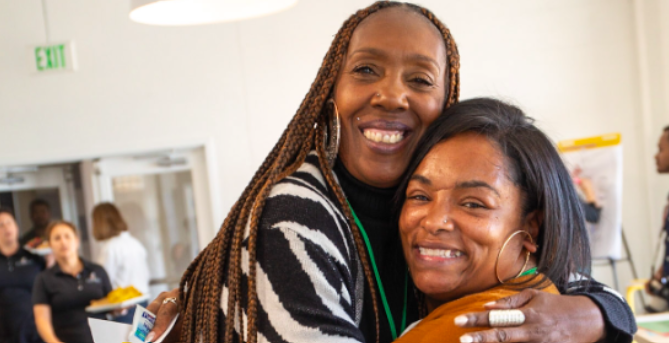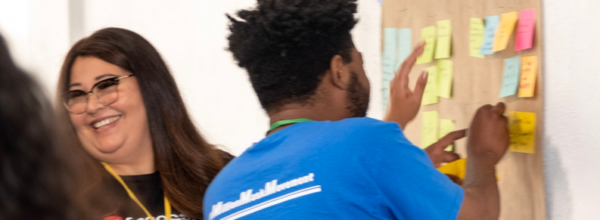The Center for Care Innovations (CCI) recently gathered community health leaders to reflect on a key question: How might we imagine partnership work as a way to more deeply connect to one another?
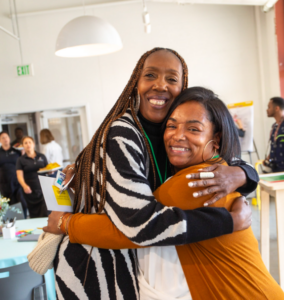
Zhonnet Harper of Alameda Health System hugs Lisa Marie Riley of the County of Marin Health and Human Services / Credit: Patanisha Alia Williams and team
California is investing heavily in strengthening multisector partnerships. Much of this work is focused on developing technical and tactical skills together with nonprofits — boosting the “multisector” part of the equation. But what about the “partnerships” piece? Relational work is a critical part of systems change and community health transformation. That’s why we were so thrilled to host “From Collaboration to Co-Liberation: Reimagining Partnerships for Healing” – a celebration of CCI’s program to strengthen partnerships that prevent domestic violence, Amplify Healing Connections.
At the festive gathering at Fort Mason Center on the San Francisco Bay, we took an artful approach to human connection – bringing in local creatives to help us think outside the box. Attendees joined in guided meditation, self-care exercises, shared stories and laughter over heaping plates of food, and participated in seminars on everything from the power of presence and “un-masking” to heart-focused breathing. They were treated to a visioning and improv workshop by TC Duong, a printmaking workshop with Arte Nopal, and a poetry reading from Nadia Elbga, Oakland’s Youth Poet Laureate. They also attended a powerful fireside chat on building meaningful partnerships amid the stress, rewards and vicarious trauma of work with patients in communities of color suffering from racism, underinvestment, violence and neglect.
“This is exactly what I needed today,” said one participant who worked in an urban nonprofit serving low-income and unhoused people, many with substance use disorders and mental illness, gesturing at the gathering. “I love my work, but the neighborhood I work in can be really raw and exhausting. There’s so much suffering, and yesterday was especially hard. So I feel so grateful to be here; it feels really healing and uplifting.”
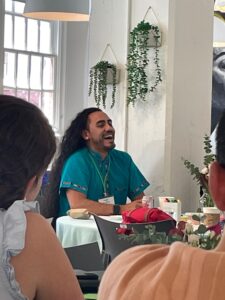
Angel Martinez, director of community engagement at community programs for the Los Angeles County, Department of Health Services, laughs at a joke from the speaker onstage./ Credit: D. Hembree
Jacqueline Nuila of CCI agreed. She observed that since the pandemic, “We’ve all been disconnected from each other in multiple ways: physically, emotionally, and collaboratively. Our work is so deeply personal that being in person made the event so much more powerful.”
Here are the CCI staff’s top lessons learned from the one-day event — a rare opportunity for both community learning and self-care:
Lessons Learned
Invest time upfront to develop a deep understanding of each other and shared values, beyond organizational roles. Nurture those relationships.
“Tragically, collectives die when we don’t prioritize healing, integrity and wholeness as much as we prioritize the work,” said Jenée Johnson, the event’s keynote speaker, who leads a unique effort to bring mindfulness into public health practices and programs at the San Francisco Department of Public Health.
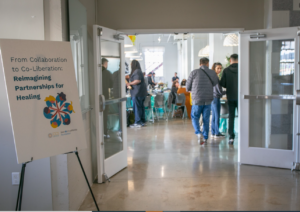
Come on in: Entering a light-filled space at Fort Mason Center / Credit: Patanisha Alia Williams and team
“Many nonprofits and social change spaces are in the business of addressing what is so desperately flawed in our culture, while at the same time replicating the patterns they are trying to disrupt,” said Johnson, a mindfulness, trauma and racial healing coach.
“This can show up as workaholism and a lack of empathy. A practice of protecting dysfunctional behavior at the expense of everyone in the organization. Power honing, perfectionism. A lack of self and collective care. Little to no time for staff and valuing productivity over centering relationships with staff and community. So the work is to transform your organization first. Because you can’t give what you don’t have.”
Create formal and informal healing-centered spaces that foster social connection and psychological safety.
“Work on the problems without always trying to be the solution,” says Johnson. “Allow people space to access their own genius. Because sometimes if you just give people space, they’ll come up with the answer for themselves.”
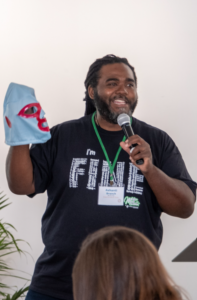
Ashanti Branch of the Ever Forward Club holds up one of the “masks” he’s used in the past. Credit: Credit: Patanisha Alia Williams and team
After Johnson’s talk and a break, attendees practiced creating healing-centered spaces with an engaging workshop by Ashanti Branch of the Ever Forward Club, whose organization encourages people to show the vulnerable parts of themselves they tend to hide behind a mask. Branch led a series of “un-masking” exercises, beginning with one in which audience members were asked to write three aspects of themselves they let people see and three they kept hidden. The cards were anonymous and later scrambled and displayed on the wall, revealing a striking gap in the faces people presented to the world and their authentic selves. After some further exercises, Branch concluded by encouraging the audience to open up more, but not in a way that left them too vulnerable. As Angel Martinez of Los Angeles County Department of Health Services said of the workshop, “I feel seen, but not exposed.”
“I know the masks are part of our own defense mechanisms as a kid to grow up and have to navigate the world the best way we could,” Branch concluded. “We created them. Sometimes we still need them. The longest distance most people travel is the 18 inches between their head and their heart. And I’m just here to remind you that there is more to you than anybody can ever see by just looking at you.”
Embrace vulnerability, transparency, and honest communication as a daily practice.
“We have to hold our own shenanigans, our own frailties, our own shadows, integrate them, and have compassion for each other,” said Johnson. “Ultimately, we still have to learn how to be at the table with people who do not think or believe what we believe. You can be mad, but you can’t leave the room.”
“Collaboration moves at the speed of trust,” said Emma Fay, program coordinator at the Community Action Partnership of San Luis Obispo County (third from left, below).. But as she and the other Fireside Chat panelists noted, trust isn’t built overnight, and honesty, transparency and vulnerability are integral to the process. To help strengthen partner communication and trust, Fay goes to community events that she knows are important to her partners. If someone is in a local play, she’ll be there applauding in the audience. And when it comes to communication, she tries to meet people where they are.
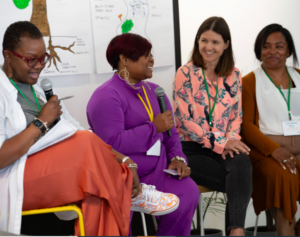
Fireside Chat panel on building relationships (L-R): Colette Reid-Horn, Timiza Wash, Emma Fay, and Lisa Marie Riley. Not pictured: Charis Baz / Credit: Patanisha Alia Williams and team
Lead by listening to youth, adult allies, and community members to define what success looks like. Add value, don’t extract value.
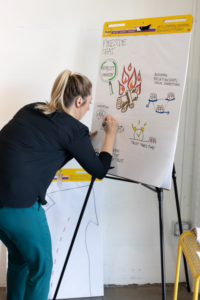
Kathleen Figoni of CCI working on a journey map of the event. Credit: Patanisha Alia Williams and team
“I think trust is the answer to everything,” said Timiza Wash, chief program equity officer of equity and transformational change at WEAVE. “Everything that happens is based on trust. One way is to be vulnerable and authentic. Also, it takes time to get to know people, so you need to make that time.”
“The community wants to see realness and honesty – they can see right through you when you’re not being authentic,” she added. “And so be transparent and don’t bring that superhero complex where you can do all things – and build a culture of belonging internally.”
Wash also encouraged attendees to have conversations at all levels of their organizations. At WEAVE, it was a huge “ah-ha” moment when they engaged the custodians and maintenance staff in their work on resilience. “Connect with people who don’t know they can be changemakers,” she said.
Colette Reid-Horn, an author, therapist, and social services sector leader who was facilitating the panel discussion, agreed. Besides discussing how people in partnerships need to be seen, heard, valued and respected, she reminded participants of the value of being present. “Be mindful of the things you’re not looking for,” she said, “and be mindful of that process.”
Take creative risks, try new ideas, and learn from new ways of working together and with community.
Don’t worry if it feels a little messy or disorganized. “When there’s true learning, there needs to be an element of chaos,” said Fay of the Community Action Partnership.
Charis Baz, who works for Marin County Health and Human Services, encouraged attendees to try a human-centered design activity that helped her launch Seeds of Hope, a program to increase connection in the homelessness community to reduce deaths related to alcohol and other drugs. It’s called “how might we” statements, a technique to focus your brainstorming while increasing the number of ideas you and your team come up with. By asking “how might we…” it helps turns your challenge framing into a question that can be solved.
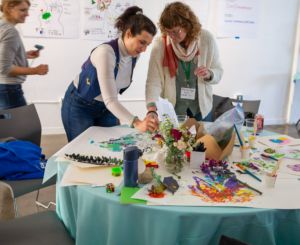
Participants from the nonprofit FACES working on a collaborative printmaking project led by Carla Hinojosa of Arte Nopal /Credit: Patanisha Alia Williams and team
Give each other grace to navigate setbacks and challenges. Be flexible and willing to adapt as needed.
During difficult conversations, Johnson said, pay attention to what is happening inside. “Stay grounded in your body, recognizing thoughts and emotions for what they are,” she said. “Encourage curiosity and non-judgment and hold back with an attitude of kindness. Be curious about what is happening in your body. Because your body is going to tell you first because anything else does.”
“Mindfulness is about being present,” she added. “It’s very challenging for us to be present because the dominant culture and multitasking has us be about 5, 6, 7 things at one time. And that is one of the reasons why our nervous systems are so activated and so stressed. So I’m going to ask you to come home to your own body and your own heart. Because it’s in the power of presence that you will bring your beauty and your gifts, your superpowers, your contribution to the communities that you serve.”
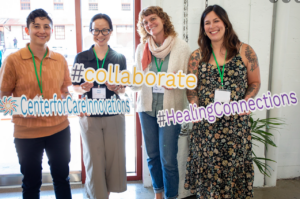
Credit: Patanisha Alia Williams and team
Protect time to tend to self-care and “squad” care. Acknowledge our interdependence and interconnectedness.
“Suffering is universal,” Johnson says. “It doesn’t belong to any one group, so we’re not going to play the suffering Olympics. But we need to remember that pain and suffering can lead to growth and connection.” Allowing ourselves a moment to pause, reassess and take time to connect with our minds and bodies supports our ability to hold empathy for others and ourselves.
Wash said that her organization has been working to create a “pause culture.” Before staff were rushing to move from one grant to the next, never giving themselves time to think about what they’re doing and what they want to accomplish. Now, there’s an intentional effort to make time and space for more reflection.
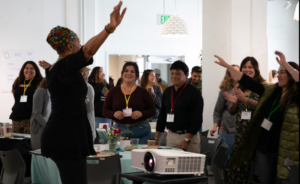
Johnson leads the group in a stretching and mindful breathing exercise / Credit: Patanisha Alia Williams and team
Recognize that partnership development and collaboration is a fluid and emergent process. There is no single path or approach.
Just like equity work, partnership work is not linear and takes time to build. “Moving at the speed of trust” is how organizations can organically grow in their understandings of one another and deepen their connections. As Johnson said, “You’re not obligated to win. You are obligated to keep trying to do the best you can do every day.”
To deepen connections with partners, Johnson said, people first need to connect with themselves. “We’re here to be in connection, so your journey is discovering yourself and reaching a place of calm, clarity and happiness. This makes it easier to solve conflicts and to cooperate. We need to put down our devices — we are addicted to our devices, the scroll, the algorithms that suck us in on purpose… Stop, take a breath, give yourselves grace, think about what brings you joy. Because to elevate the people, you’ve got to elevate yourself.”
Honor and celebrate community assets and strengths, including connection to culture, land, and lived experiences.
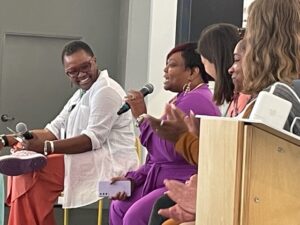
Colette Reid-Horn (left) and other panelists were delighted by Wash’s spontaneous a capella / Credit: D. Hembree
Timiza Wash reflected on the beauty and suffering of her own community in South Sacramento and the pain she felt at seeing unhoused Black women, some weighed down by plastic bags full of pain and disappointment. She quoted a few lines from the song “Bag Lady” by Erykah Badu, then broke into song on the chorus as her fellow panelists applauded and joined the impromptu a capella:
Pack light…
Bag lady you gone hurt your back
Dragging all them bags like that
I guess nobody ever told you
All you must hold onto, is you, is you, is you.
Find this useful or interesting? We’re constantly sharing stuff like this. Sign up to receive our newsletter to stay in the loop.

